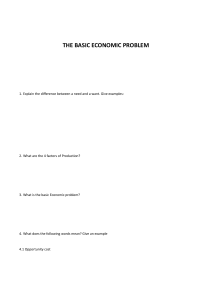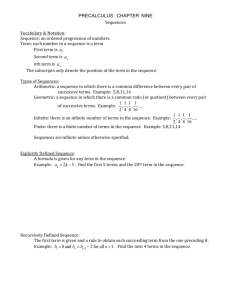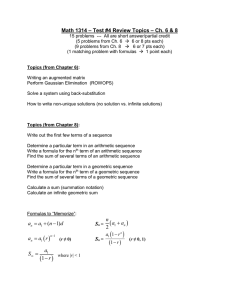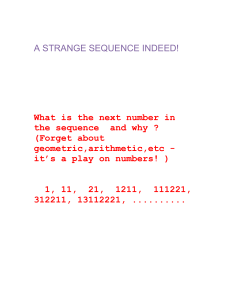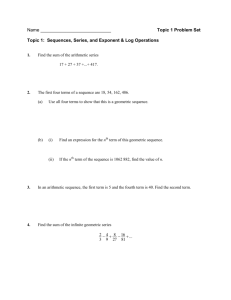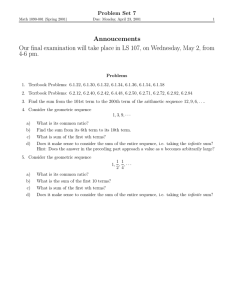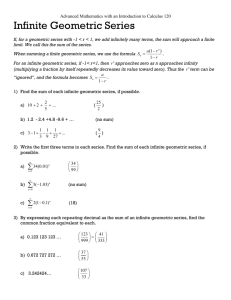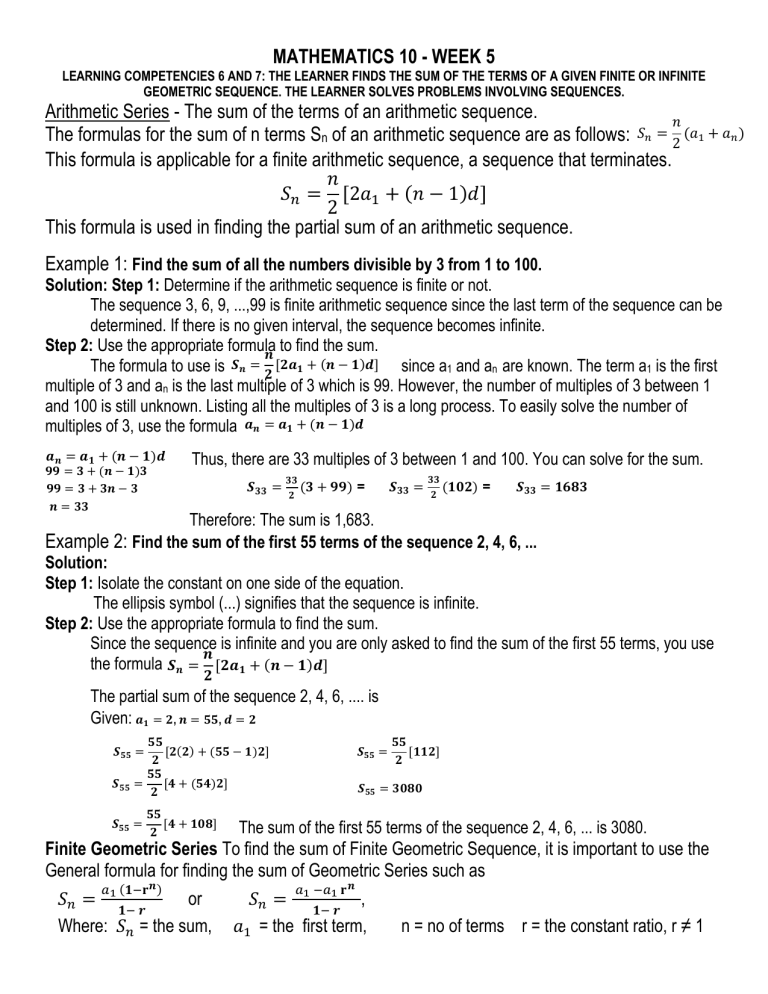
MATHEMATICS 10 - WEEK 5 LEARNING COMPETENCIES 6 AND 7: THE LEARNER FINDS THE SUM OF THE TERMS OF A GIVEN FINITE OR INFINITE GEOMETRIC SEQUENCE. THE LEARNER SOLVES PROBLEMS INVOLVING SEQUENCES. Arithmetic Series - The sum of the terms of an arithmetic sequence. 𝑛 The formulas for the sum of n terms Sn of an arithmetic sequence are as follows: 𝑆𝑛 = 2 (𝑎1 + 𝑎𝑛 ) This formula is applicable for a finite arithmetic sequence, a sequence that terminates. 𝑛 𝑆𝑛 = [2𝑎1 + (𝑛 − 1)𝑑] 2 This formula is used in finding the partial sum of an arithmetic sequence. Example 1: Find the sum of all the numbers divisible by 3 from 1 to 100. Solution: Step 1: Determine if the arithmetic sequence is finite or not. The sequence 3, 6, 9, ...,99 is finite arithmetic sequence since the last term of the sequence can be determined. If there is no given interval, the sequence becomes infinite. Step 2: Use the appropriate formula to find the sum. 𝒏 𝑺 = [𝟐𝒂 The formula to use is 𝒏 𝟐 𝟏 + (𝒏 − 𝟏)𝒅] since a1 and an are known. The term a1 is the first multiple of 3 and an is the last multiple of 3 which is 99. However, the number of multiples of 3 between 1 and 100 is still unknown. Listing all the multiples of 3 is a long process. To easily solve the number of multiples of 3, use the formula 𝒂𝒏 = 𝒂𝟏 + (𝒏 − 𝟏)𝒅 𝒂𝒏 = 𝒂𝟏 + (𝒏 − 𝟏)𝒅 𝟗𝟗 = 𝟑 + (𝒏 − 𝟏)𝟑 𝟗𝟗 = 𝟑 + 𝟑𝒏 − 𝟑 𝒏 = 𝟑𝟑 Thus, there are 33 multiples of 3 between 1 and 100. You can solve for the sum. 𝑺𝟑𝟑 = 𝟑𝟑 (𝟑 + 𝟐 𝟗𝟗) = 𝑺𝟑𝟑 = 𝟑𝟑 (𝟏𝟎𝟐) 𝟐 = 𝑺𝟑𝟑 = 𝟏𝟔𝟖𝟑 Therefore: The sum is 1,683. Example 2: Find the sum of the first 55 terms of the sequence 2, 4, 6, ... Solution: Step 1: Isolate the constant on one side of the equation. The ellipsis symbol (...) signifies that the sequence is infinite. Step 2: Use the appropriate formula to find the sum. Since the sequence is infinite and you are only asked to find the sum of the first 55 terms, you use 𝒏 the formula 𝑺𝒏 = [𝟐𝒂𝟏 + (𝒏 − 𝟏)𝒅] 𝟐 The partial sum of the sequence 2, 4, 6, .... is Given: 𝒂𝟏 = 𝟐, 𝒏 = 𝟓𝟓, 𝒅 = 𝟐 𝟓𝟓 [𝟐(𝟐) + (𝟓𝟓 − 𝟏)𝟐] 𝟐 𝟓𝟓 = [𝟒 + (𝟓𝟒)𝟐] 𝟐 𝟓𝟓 [𝟏𝟏𝟐] 𝟐 𝑺𝟓𝟓 = 𝑺𝟓𝟓 = 𝑺𝟓𝟓 𝑺𝟓𝟓 = 𝟑𝟎𝟖𝟎 𝑺𝟓𝟓 = 𝟓𝟓 [𝟒 + 𝟏𝟎𝟖] 𝟐 The sum of the first 55 terms of the sequence 2, 4, 6, ... is 3080. Finite Geometric Series To find the sum of Finite Geometric Sequence, it is important to use the General formula for finding the sum of Geometric Series such as 𝑎 (𝟏−𝐫 𝒏 ) 𝑆𝑛 = 1 or 𝟏− 𝒓 Where: 𝑆𝑛 = the sum, 𝑎 −𝑎 𝐫 𝒏 𝑆𝑛 = 1 1 , 𝟏− 𝒓 𝑎1 = the first term, n = no of terms r = the constant ratio, r ≠ 1 Example 1: Find the sum of the first 6 terms of the geometric sequence 3, -6, 12, ... Solution: Step 1: Write the following given. Given: 𝒂𝟏 = 𝟑, 𝒏 = 𝟔 and 𝒓 = − 𝟔𝟑 = −𝟐 Step 2: Use the appropriate formula to find the sum. 𝑆𝑛 = 𝑎1 (𝟏−𝐫𝒏 ) Example 2: 𝟏− 𝒓 => 𝑆6 = 3[1−(−𝟐)𝟔 ] 𝟏−(−𝟐) => 𝑆6 = 3[1−𝟔𝟒] 𝟏+𝟐 => 𝑆6 = 3[−63] 𝟑 => 𝑆6 = −𝟔𝟑 7 Find the sum of the finite geometric sequence ∑ 2𝑛−1 𝑛=1 Solution: Step 1: Write the following given. = 21−1 + 22−1 +23−1 + ⋯ + 27−1 = 20 + 21 +22 + ⋯ + 26 Step 2: Apply the formula for the sum of a finite geometric sequence. Note that 𝑎1 = 1, 𝑟 = 2 and 𝑛 = 7 𝒂 (𝟏−𝐫 𝒏 ) (𝟏)(𝟏−𝟐𝟕 ) 𝟏−𝟏𝟐𝟖 −𝟏𝟐𝟕 𝑺𝒏 = 𝟏 => 𝑺𝟕 = 𝟏−𝟐 => 𝑺𝟕 = −𝟏 => 𝑺𝟕 = −𝟏 => 𝑺𝟕 = 𝟏𝟐𝟕 𝟏− 𝒓 Infinite Geometric Series The sum of infinite G Sequence can be described in the form: 𝑆∞ = (𝟏𝑎–1 𝒓 ) , 𝑤ℎ𝑒𝑟𝑒 − 1 < 𝒓 < 𝟏 However, when r ≥ 1 or r ≤ -1, there is no infinite sum. Why do you think so? Can you prove it? Infinite Geometric Series An infinite geometric series has an infinite number of terms. Convergent Series A series that has a sum. Divergent Series A series that does not have a sum. Examples: Find the sum of each infinite series, if it is exists. Explain why the sum exist ∞or does not exist. ∞ 𝑛−1 1 1 a) 1 + + + ⋯ c). ∑ 4 (1) d).∑ 3(2)𝑛−1 5 25 𝑛=1 b) 4 + 12 + 36 + ⋯ Solution: 1 a). From the given series 1 + + 5 1 𝑎2 5 𝑎1 𝑎1 = 1, 𝑎2 = , and 𝑟 = 1 25 = 3 𝑛=1 + ⋯ the following are obtained 1 5 1 = 1 5 Since |𝑟| < 1 𝑜𝑟 𝑏𝑒𝑡𝑤𝑒𝑒𝑛 − 1 𝑎𝑛𝑑 1, the series converges. Therefore, the sum can be determined. 𝑆∞ = 𝑎1 (𝟏 – 𝒓 ) => 𝑺∞ = 𝟏 𝟏− 𝟏 𝟓 => 𝑺∞ = 𝟓 𝟒 b). From the given series 4 + 12 + 36 + ⋯ the following are obtained 𝑎1 = 4 , 𝑎2 = 12 , and 𝑟 = 𝑎2 𝑎1 = 12 4 =3 Since |𝑟| ≥ 1, the series diverges. Therefore, the sum cannot be determined. c). From the given series ∞ 1 𝑛−1 ∑4( ) 3 the following are obtained 𝑛=1 1 1−1 1 0 1 2−1 1 1 1 4 𝑎1 = 4 ( ) = 4 ( ) = 4(1) = 4 𝑎2 = 4 ( ) = 4( ) = 4( ) = 3 3 3 3 3 3 𝑟= 𝑎2 4 4 1 1 𝑎1 = 3 ÷ 4 = 3 × 4 = 3 Since |𝑟| < 1 𝑜𝑟 𝑏𝑒𝑡𝑤𝑒𝑒𝑛 − 1 𝑎𝑛𝑑 1, the series converges. Therefore, the sum can be determined. 𝑆∞ = 𝑎1 (𝟏 – 𝒓 ) ∞ d). From the given series ∑ 3(2)𝑛−1 => 𝑺∞ = 𝟒 𝟏− 𝟏 𝟑 => 𝑺∞ = 𝟔 the following are obtained 𝑛=1 𝑎1 = 3(2)𝑛−1 = 3(2)1−1 = 3(2)0 = 3(1) = 3 𝑎2 = 3(2)𝑛−1 = 3(2)2−1 = 3(2)1 = 3(2) = 6 Since |𝑟| ≥ 1 , the series diverges. Therefore, the sum cannot be determined. 𝑟 = 𝑎𝑎2 = 63 = 2 1
